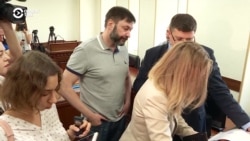A Kyiv court on August 28 ruled to release Kirill Vyshinsky, the editor-in-chief of the Ukrainian bureau of the Russian news service RIA Novosti Ukraine, from preliminary detention, pending trial for high treason.
Ukrainian President Volodymyr Zelenskiy earlier had proposed an exchange of Vyshinsky for Ukrainian film director Oleh Sentsov, who is serving 20 years in Russia on charges of alleged bombings and illegal arms possession. In an interview with Current Time, however, Vyshinsky, who has both Russian and Ukrainian citizenship, stated that he had not signed papers for an exchange with Ukrainian prisoners in Russia.
“From the very start, from that moment that some Ukrainian officials and politicians insisted upon my exchange, I stated that it’s hardly the attitude to have toward an innocent person,” Vyshinsky said.
Under the terms of his release, the 52-year-old journalist must appear in court to face trial, avoid communicating with witnesses in his case, and notify the court about changes of residence and work. His passport will, for the moment, remain at the Ukrainian Prosecutor-General’s Office, but his attorneys are petitioning for its return.
Russia’s delegation to the Organization for Security and Co-operation in Europe described Vyshinsky’s release as “just [the] start.” It tweeted that it expects the “unfounded and fictional criminal charges” against the journalist to “be rejected.”
Kirill Vyshinsky was arrested in May 2018 and charged with high treason under Article 111 of the Ukrainian Criminal Code. He is also changed with illegal arms trafficking.
Ukrainian investigators claimed that Russian state-controlled media outlets like RIA-Novosti were used as part of Russia’s “hybrid information warfare against Ukraine.”
They asserted that Vyshinsky received an assignment in spring 2014 to go to Crimea for “subversive information attacks“ that would justify Russia’s annexation of the peninsula from Ukraine that year. The Ukrainian Security Service alleged that, in exchange for these efforts, the Russian state had paid Vyshinsky 53,000 euros ($58,715) per month and granted him a Russian state award called For the Return of Crimea.
Vyshinsky denied the charges, countering that he had just been doing his job as a journalist.






Facebook Forum